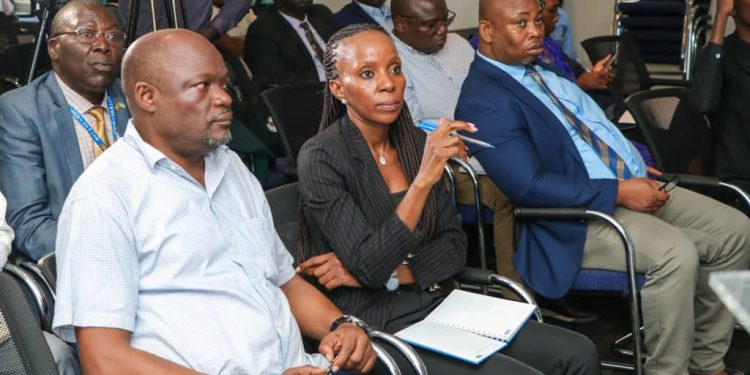The National Association of Broadcasters, an umbrella body for all broadcasters in the country have expressed dissatisfaction with a directive by the Uganda Communication Commission to have all content classified by the Media Council before broadcast.
Last week, UCC came out and reported a surge in explicit content being broadcast by local media and ordered that all video content including music videos, audio are cleared by the Media Council before they are played on air as per the Press and Journalists Act cap 105.
The commission further warned that any failure to comply with these directives would result into serious legal consequences for any offer fing broadcaster.
In a meeting held on Wednesday 23rd October 2024, between UCC, broadcasters and stakeholders, local broadcasters expressed mixed feeling about the directive.
Speaking during the meeting, NAB chairperson, Dr.Innocent Nahabwe described the directive as being hard to enforce, noting that the growth of the media industry has come with its own challenges.
“Beyond just the radio and TV, we now have social media playing in the same field. In that regard, content has also moved from what we used to watch on UBC that we now have a change in the content aired. The issues we now have are as a result of the liberalization of the air waves which has increased competition among media houses,” Nahabwe said.
“Because of the increased competition, there is an increasing need to outdo each other. The trade is therefore changing.”
He further noted that said whereas content that goes through TVs and radios can be regulated, the same cannot be done with social media platforms like tiktok, Facebook, whatsapp and others which can be accessed on hand gadgets especially smartphones
“There is a growing influence of the public now, each with their phone, generating content and accessing content they want” , he said
In the same meeting were artists, musicians as well as online content creators; Nahabwe urged the musicians to always ensure their songs and videos are classified by the media council of uganda. An artist is required to pay at least USD 200 to have their work classified which acting to them is quite expensive.
Charles Batambuze the deputy chairperson of the National Culture Forum an umbrella body for creatives says whereas the directive is a good move to preserving values and integrity it is oppressive to many artists who are not earning much from their works. He instead recommends that UCC strengthens enforcement of the copyright to ensure broadcasters pay artists before broadcasting their works.
“UCC has not offered us the desired protection for us to benefit from our content, it should at least ensure that broadcasters obtain licences to use our songs or films on thier Tvs and radios.”
He also points out that creatives are losing huge chunks of money to illicit transfer of their content through social media.
“These days our content is transferred through phones, tablets, computer, flash disc and other gadgets, we had requested that government through the copyright law starts collecting taxes on these gadgets and then this money can be reverted to the artists,” said Batambuze.
Similarly, the Media Council of Uganda says that they doing everything possible to ensure that all local content is classified as required by law, however they are finding a hard time dealing with explicit content transmitted through social media
“ All movies must be films and movies must be presented to the media council for classification, to give it a public rating whether PG, for all or it has adult content, however were currently engaging online content creater to make sure there in the know of the procedures,” said Peter Okello, the vice chairman of the media council.
Speaking during the meeting, Suzan Wegoye, the UCC director for legal affairs said there is a troubling resurgence of inappropriate content being aired across various media channels that needs to be regulated.
“As UCC we have observed that there is an alarming increase in the nature of this inappropriate content which is not only offensive but also seen as distressing and this is only manifested in music, lyrics, videos and interviews where there are inappropriately dressed performers engage in suggestive dances and songs that filled with explicit sexual innuendos and inappropriate messages,” Wegoye said.
The UCC director for legal affairs insisted these practices are in direct violation of minimum broadcasting standards as outlined Section 31 of the UCC Act.
“You must ensure that any program broadcasted aligns with public morality, complies with existing laws and that adult oriented content is appropriately scheduled. If you are a content producer or aggregator, or whatever it is but you are responsible for the different stages of content, please ensure that it complies with the requirements of the law.”
Julian Mweheire, the director industry affairs and content at UCC said in shaping public discourse and influencing societal values, broadcasters are entrusted with the responsibility to educate, inform and entertain but said this comes with accountability.
“These standards are not just a regulatory requirement but they are essential guidelines that ensure that content is responsible, respectful and reflective of the diverse society we serve,” she said.
As the meeting ended, both parties agreed to continue with the engagement to ensure they reach an understanding.


